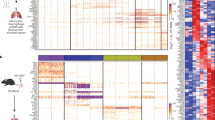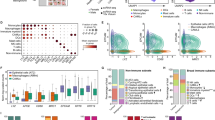Abstract
THERE is increasing evidence that many tumours contain appreciable numbers of macrophages1–3, and that these inflammatory cells can be cytotoxic for various neoplastic cells in vitro4,5. Thus at first it seems paradoxical that many tumours are progressive and lethal in spite of a high content of macrophages. But to kill a malignant cell, these inflammatory cells must be brought to an ill-defined state of ‘activation’6,7. It is therefore conceivable that the macrophages in progressing tumours are less activated, and thus less cytotoxic, than those in spontaneously regressing neoplasms. To test this hypothesis we isolated macrophages from either regressing or progressing Moloney sarcomas and tested them in vitro for their capacity to release chromium-51 (51Cr) from prelabelled target cells. The former were usually significantly more cytotoxic than the latter.
This is a preview of subscription content, access via your institution
Access options
Subscribe to this journal
Receive 51 print issues and online access
$199.00 per year
only $3.90 per issue
Buy this article
- Purchase on SpringerLink
- Instant access to the full article PDF.
USD 39.95
Prices may be subject to local taxes which are calculated during checkout
Similar content being viewed by others
References
Evans, R. Transplantation 14, 468–473 (1972).
Wood, G. W., Gillespie, G. Y. & Barth, R. F. J. Immun. 114, 950–957 (1975).
Russell, S. W., Gillespie, G. Y., Hansen, C. B. & Cochrane, C. G. Int. J. Cancer 18, 331–338 (1976).
Evans, R. Ann. N. Y. Acad. Sci. 256, 275–287 (1975).
Haskill, J. S., Proctor, J. W. & Yamamura, Y. J. natn. Cancer Inst. 54, 387–393 (1975).
Fidler, I. J. J. natn. Cancer Inst. 55, 1159–1163 (1975).
Alexander, P. & Evans, R. Nature new Biol. 232, 76–78 (1971).
Russell, S. W. & Cochrane, C. G. Int. J. Cancer 13, 54–63 (1974).
Russell, S. W., Francke, U., Buettner, L. & Cochrane, C. G. J. natn. Cancer Inst. 53, 801–806 (1974).
Fefer, A., McCoy, J. L., Perk, K. & Glynn, J. P. Cancer Res. 28, 1577–1585 (1968).
Russell, S. W., Doe, W. F., Hoskins, R. G. & Cochrane, C. G. Int. J. Cancer 18, 322–330 (1976).
Russell, S. W., Gillespie, G. Y. & McIntosh, A. T. J. Immun. 118, 1574–1579 (1977).
Gillespie, G. Y., Hansen, C. B., Hoskins, R. G. & Russell, S. W. J. Immun. (in the press).
Author information
Authors and Affiliations
Rights and permissions
About this article
Cite this article
RUSSELL, S., MCINTOSH, A. Macrophages isolated from regressing Moloney sarcomas are more cytotoxic than those recovered from progressing sarcomas. Nature 268, 69–71 (1977). https://doi.org/10.1038/268069a0
Received:
Accepted:
Published:
Issue date:
DOI: https://doi.org/10.1038/268069a0
This article is cited by
-
Modulation of monocyte matrix metalloproteinase-2 by breast adenocarcinoma cells
Breast Cancer Research (2005)
-
Monocyte/Macrophage Activation by Immunostimulators
Clinical Immunotherapeutics (1996)
-
Induction of cell-mediated immunity against B16-BL6 melanoma in mice vaccinated with cells modified by hydrostatic pressure and chemical crosslinking
Cancer Immunology Immunotherapy (1993)
-
Treatment of established tumor by adoptive immunotherapy with specifically immune T cells
Survey of Immunologic Research (1985)
-
Migration activity of syrian hamster peritoneal exudate cells under normal conditions and after suppression of their natural tumor resistance
Bulletin of Experimental Biology and Medicine (1984)



